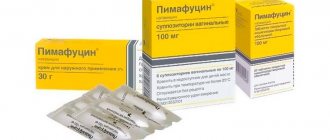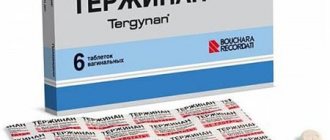The physiological decrease in immunity during pregnancy leads to the fact that many women periodically develop thrush. This is a very unpleasant disease, it is accompanied by itching, inflammation and pain. The disease is provoked by the proliferation of opportunistic fungi from the genus Candida. Let's figure out whether it is permissible to use Nystatin during pregnancy.
Many pregnant women experience symptoms of candidiasis. This is due to the fact that during pregnancy the immune system functions in a special mode so as not to harm the child.
In no case should you tolerate the manifestations of thrush; this disease is by no means harmless. The spread of a fungal infection is dangerous for the baby. Therefore, when symptoms appear, a visit to a gynecologist is necessary, who will prescribe treatment.
Is Nystatin allowed during pregnancy?
The instructions for the antifungal drug Nystatin list pregnancy as a contraindication. However, the same document speaks of the possibility of prescribing the drug in cases where the risk to the fetus does not exceed the expected benefit to the health of the mother. In this way, the drug manufacturer insures itself against possible claims, as do most pharmaceutical companies in similar circumstances. There have been no clinical trials that would reliably indicate the negative effects of Nystatin on the fetus or the course of pregnancy.
The instructions for Nystatin list pregnancy as a contraindication for taking the drug, but in practice it is often prescribed to expectant mothers
The active substance of the same name - nystatin - belongs to the class of drugs with antifungal and fungistatic (suppressing the growth of fungi) effects. Once in the habitat of fungi of the genus Candida, nystatin binds to sterols - components of the cell membranes of fungi. In this case, the fungal cells are destroyed, and the fungi themselves die.
Nystatin affects only fungi, without affecting the vital activity of other inhabitants of the microflora of the affected area of the skin or mucous membrane, harmful or normal.
Nystatin is not addictive: fungi very slowly develop resistance to the drug. When applied topically, the active substance is practically not absorbed into the blood, and, accordingly, is not able to have a significant systemic effect on the body .
In what cases and for what period can a doctor prescribe it?
Today, when modern antifungal agents with proven safety and higher efficiency have appeared, Nystatin is prescribed by doctors less and less often. However, the availability of the price category of the drug and the fairly successful long-term practice of its use do not allow Nystatin to be excluded from the list of drugs used to treat candidiasis in pregnant women.
Nystatin belongs to the group of antibiotics and has an antifungal effect. The main and only indication for its use is candidiasis (infection with fungi of the genus Candida) of various localizations:
- mucous membranes and skin;
- organs of the gastrointestinal tract;
- genitals.
Nystatin is also used as a prophylactic agent in the following cases:
- when undergoing a long course of treatment with antibiotics;
- with local use of antibiotics;
- before and after surgical interventions.
It should be remembered that the use of any medications in the first trimester of pregnancy (the first 12 weeks), and especially those whose effects on the body of a pregnant woman have not been studied, is strictly not recommended. At the beginning of pregnancy, you can resort to more gentle means of combating fungal infections. Current medical practice allows the administration of Nystatin to pregnant women only in the second and third trimesters of pregnancy.
In the first trimester, Nystatin is strictly contraindicated.
Indications
Nystatin can be prescribed to a pregnant woman if she has been diagnosed with one of the following diseases:
- vaginal candidiasis;
- other fungal infections of the skin and mucous membranes.
For these indications, vaginal and rectal suppositories, as well as ointment for external use, can be prescribed.
For candidiasis of internal organs and for the prevention of fungal infections during long-term use of systemic antibiotics, Nystatin is practically not prescribed; doctors prescribe more modern and safe medications.
Successful long-term practice and low price category allow Nystatin not to lose popularity.
Contraindications and side effects
The list of contraindications to treatment with the drug, in addition to pregnancy, includes:
- pancreatitis;
- peptic ulcer of the stomach or duodenum;
- liver pathologies;
- individual intolerance to the components of the drug;
- breastfeeding period.
During treatment with Nystatin, the following unpleasant side effects may occur to varying degrees:
- decreased appetite;
- nausea and vomiting;
- gastrointestinal disorders;
- allergic reactions - burning, itching of the skin and mucous membranes;
- chills;
- increase in body temperature.
It should be noted that side effects are quite rare. However, a pregnant woman should pay special attention to the occurrence of minimal warning signs. If they appear, you should contact your doctor, who will select another remedy to fight the infection.
The prescription of nystatin drugs has some peculiarities in terms of combination with other medications. For example, simultaneous use of nystatin with clotrimazole (another popular antifungal agent) significantly reduces the effectiveness of the latter.
Precautionary measures
Preparations containing Nystatin have a number of contraindications. Any form cannot be recommended for use in the following conditions:
- intolerance to any of the ingredients of the drug;
- gastrointestinal diseases - ulcerative lesions of organs, pancreatitis, liver diseases;
- lactation period.
Side effects during treatment are very rare, but they are not excluded. In some cases, the following reactions can be observed:
- digestive disorders;
- poor appetite;
- slight increase in temperature;
- local skin reactions - itching, rash, redness at the sites where the ointment was applied.
If such reactions occur, it is necessary to consult a gynecologist and select another drug to treat the fungal infection.
So, Nystatin is not prescribed very often during pregnancy, since this remedy is considered outdated. However, in some cases the use of this particular drug is justified. Therefore, if your doctor prescribes Nystatin, you should not refuse. However, in the first trimester, the use of drugs containing nystatin is considered unacceptable. At this time, doctors use safer drugs to treat thrush. But starting from the second trimester, the drug can be used.
Instructions for safe use
What is prescribed: ointment, suppositories or tablets
Nystatin is available in three pharmaceutical forms:
- Suppositories (candles) - rectal and vaginal. The package, as a rule, contains 10 suppositories, each of which contains 250 or 500 thousand units of active ingredient. Rectal suppositories are used for local treatment of candidiasis of the lower intestines, vaginal suppositories are used for the treatment or prevention of vaginal candidiasis.
- Tablets are also available in two concentrations of the active ingredient. Nystatin tablets are used to treat candidiasis of internal organs and prevent other types of candidiasis.
- Nystatin ointment - tubes from 10 to 30 g, with a nystatin concentration of 100 thousand units per 1 g of ointment. The ointment is used for local treatment of candidiasis of the skin, mucous membranes and nails.
During pregnancy, taking Nystatin tablets is prohibited! Vaginal suppositories are most often prescribed. For chronic vaginal candidiasis, the doctor may prescribe the simultaneous use of suppositories and ointments.
Nystatin tablets are not prescribed to pregnant women
Nystatin ointment can be used with the least risk to the health of the unborn baby. It does not have any systemic effect on the body of a pregnant woman due to the fact that it is practically not absorbed into the bloodstream.
How often and for how long can you use Nystatin?
Prescribing a treatment regimen with Nystatin during pregnancy, like any antibiotic, is within the exclusive competence of the doctor. In this case, the specialist is guided by such indicators as:
- gestational age;
- features of the course of pregnancy;
- the degree of infection of the body by the fungus.
The instructions for the drug contain the following recommendations for taking it, depending on the form of release:
- Suppositories (of both types) are inserted one at a time twice a day (morning and evening). The course of treatment is usually from 10 to 14 days.
- The ointment is applied in a thin layer to the affected area of the skin or mucous membrane twice a day for 7–10 days.
The doctor calculates a specific treatment regimen for thrush.
Features of the drug
Due to these properties, Nystatin is used in suppressing various types of infections. The most sensitive to it are candidiasis and yeast-like fungi.
Nystatin has extremely low bioavailability - within 3-5%. This means that when taken orally, it is not absorbed into the gastrointestinal tract, does not affect blood circulation, and its antifungal properties do not depend on the timing of meals.
The medicine has a targeted effect on the fungus, produces almost no metabolites and is excreted unchanged along with feces.
The antimycotic is produced in many dosage forms: tablets, ointments, rectal and vaginal suppositories. This variety helps to choose the most suitable medication for a particular disease. In addition, nystatin is included in many other medications.
Features of the use of Nystatin depend on the diagnosis and the chosen dosage form.
If a pregnant woman has developed candidiasis of the dermis or mucous membranes, then Nystatin is prescribed in the form of an ointment. The developers recommend treating the affected areas twice a day. The dermis or mucous tissues are covered with a transparent layer and lightly rubbed. The duration of use is determined individually. The standard course of therapy takes from 7 to 10 days. If necessary, the doctor may consider extending treatment.
Nystatin suppositories
Before inserting the suppository, it is necessary to carry out hygiene procedures for the genital organs.
When treating thrush, suppositories are inserted into the vagina twice a day. The recommended course is 1.5-2 weeks. In order for the fight against a fungal infection to be successful, it is necessary for the sexual partner to undergo a course of therapy. During treatment, it is recommended to avoid intimacy.
A rectal remedy is used in a similar way: suppositories are inserted into the rectum to the maximum depth in the morning and evening. The course of treatment also lasts 1.5-2 weeks. If necessary, procedures are resumed.
The mechanism of action of Nystatin is determined by its ability to destroy the structural part of the cell membrane. The medicine contains an antibiotic, which is extracted from radiant mushrooms. The active ingredient of the drug Nystatin creates a film on the surface of cells infected with candida (fungi) and, thus, prevents the cell from breathing, feeding and reproducing. Large doses of Nystatin provoke cell death, and small doses inhibit their growth.
After penetration under the membrane, the drug enters the cell and inhibits internal biochemical reactions. Thus, the membrane begins to let water, salts and other substances pass through it, having a detrimental effect on the cell as a whole. It is very important that when exposed to the body, Nystatin does not affect healthy cells.
Nystatin is available in four forms: vaginal and rectal suppositories, ointment and tablets. Both types of suppositories have two dosages - 250 and 500 thousand units of active ingredient. The ointment is available in tubes of 10 and 30 grams. The tablets are also sold in two dosages - 250 and 500,000 units of the active ingredient.
Nystatin during pregnancy is often used in the form of ointments and suppositories. Gynecologists do not recommend that patients take pills. Indications for the use of Nystatin are determined by the form of release of the drug:
- Pills. They are prescribed for the prevention of candidiasis and for its treatment;
- Rectal suppositories. Indications include therapy of fungal intestinal diseases and prevention of the spread of infection in the postoperative period.
- Vaginal suppositories. They are used to treat thrush and prevent its recurrence;
- Ointment. It is prescribed for candidiasis.
How can I replace Nystatin?
Of the entire range of antifungal drugs during pregnancy, only a few local remedies are allowed. Systemic medications (such as Fluconazole, Diflucan and others) are strictly prohibited for expectant mothers: they can have a negative impact on the development of the fetus, causing severe defects.
Table: topical antifungal drugs prescribed in different trimesters of pregnancy
| Name | Active substance | Action | Release form | Indications | Contraindications | Use during pregnancy |
| Pimafucin | Natamycin |
|
| Fungal diseases of the skin and mucous membranes caused by pathogens sensitive to the drug | Hypersensitivity to the components of the drug | No restrictions |
| Clotrimazole | Clotrimazole |
|
|
| Hypersensitivity |
|
| Livarol | Ketoconazole |
| Vaginal suppositories | Fungal infections of the vulva and vagina | Individual intolerance | The use of Livarol is prohibited in the first trimester of pregnancy. |
| Epigen Intim | Activated glycyrrhizic acid |
| Spray for external and local use |
| Hypersensitivity | No restrictions |
| Terzhinan |
|
| Vaginal tablets |
| Hypersensitivity to the components of the drug | Not recommended in the first trimester of pregnancy |
| Miramistin | Benzyldimethyl [3-(myristoylamino)propyl] ammonium chloride monohydrate | Antiseptic | Solution for topical use | Inflammatory diseases (vulvovaginitis, endometritis), including those of fungal origin | Individual intolerance | No restrictions |
Photo gallery: remedies for thrush that are not contraindicated for pregnant women
Livarol is available only in the form of suppositories for vaginal use
Clotrimazole is available in many pharmaceutical forms and is prohibited for use in the first trimester of pregnancy
Pimafucin is a highly effective antifungal drug, approved at any stage of pregnancy.
Miramistin is an antiseptic, widely used not only in gynecology, it is absolutely safe for the unborn baby
Terzhinan - broad-spectrum vaginal tablets, which also have an antifungal effect due to the nystatin included in the composition
Epigen Intim is a spray designed to restore vaginal microflora not only for fungal diseases, but also for other infectious diseases
special instructions
During treatment with Nystatin ointment, it is advisable to avoid foods that stimulate the activity of pathogenic microorganisms. Temporarily limit the consumption of sweet, salty, fatty, fried, and alcohol.
Read more Ointment with snake venom Viprosal - instructions for use
In case of contact with the conjunctiva, eyes should be rinsed with running water. To treat the organ of vision, even if the inflammatory process is caused by candidiasis, the drug is not used.
Sexual partners should be treated at the same time, even if the men do not experience any symptoms. Signs of the disease appear more often in men with low immunity.
Treatment does not require adjustment of the daily routine or change in the nature of professional activity. The drug does not affect the speed of reactions, psychomotor skills and coordination.
Can be used during pregnancy and lactation
The instructions do not contain any restrictions on the use of ointment during pregnancy - with the exception of the 1st trimester. But, during an exacerbation of thrush in a “special” condition, it is undesirable to introduce tampons. They are advised to limit treatment to the vulva. The same recommendations for the treatment of vaginal thrush for women during lactation.
It is not advisable to treat nipple areolas while breastfeeding. As already mentioned, in this case, children may refuse to breastfeed.
Drug interactions
Despite the low adsorption, when using Nystatin ointment, interaction with pharmacological drugs should be taken into account:
- enhances the effect of tetracycline;
- reduces the activity of clotrimazole;
- inhibits the effect of indirect coagulants - Phenindione, Warfarin, Coumadin and the like;
- reduces the effects of penicillins and cephalosporins.
The effect of nystatin is enhanced by Nifuratel, Polymyxin, Chymotrypsin; reduce - antacids with aluminum, magnesium or potassium. If a woman takes oral contraceptives with estrogen, the risk of intermenstrual bleeding increases. Compatibility of ointment with nystatin and retinol preparations is low. Concomitant use causes an increase in intracranial pressure. This effect should be taken into account despite the low absorption when using a topical product.
Reviews from women
Throughout my pregnancy I suffered from such an unpleasant thing as thrush. When I went into conservation for the third time, they found it again... The doctor, without further ado, prescribed me Nystatin suppositories. Nystatin suppositories are the most common in appearance and shape. The most important thing for me is the absence of unpleasant sensations when using it. Mica is difficult to remove; nail scissors saved the day. The candle melted very quickly in my hands. <…> These cheap Nystatin suppositories helped everyone in our ward who was faced with thrush. And this is the main thing. Only a doctor can recommend them, but I liked using them, there was no burning or dryness, the treatment went smoothly, and I didn’t encounter this problem again during pregnancy.
Monalisa https://otzovik.com/review_755892.html
When I found out that I was pregnant, I immediately took all the tests, and I was diagnosed with thrush in the third week. The gynecologist said that this is a hormonal change in the body and that is why it appeared. At first, on the doctor’s recommendation, I treated her with Hexicon suppositories, but this remedy did not help. Then another gynecologist said that it is better to use suppositories with nystatin, they do less harm and more benefits, and they are much cheaper. <…> After a course of suppositories, the result was short-lived; after 2 weeks the thrush returned.
olinka https://otzovik.com/review_769491.html
During pregnancy, especially in the second trimester, I was often bothered by thrush and each time the gynecologist insistently recommended that I use nystatin ointment as the discomfort intensified. Having suffered for a long time with little respite, I dared to go against the will of the doctor and bought expensive suppositories, two days later the thrush went away and for a long time did not show itself to this day. The conclusions are as follows: nystatin ointment is good in the initial stages of the disease and provided that your body itself is fighting at the same time, in other cases its effect is useless.
Yulia K. https://prodoctorov.ru/pharm/nystatin/
Video: thrush during pregnancy
Nystatin is an antifungal drug that has been proven over the years. Its main advantages include low cost and almost complete absence of addiction (in other words, the emergence of fungal resistance to the drug). When applied topically during pregnancy, Nystatin is not able to have a systemic effect on the body, and therefore, penetrate the placental barrier. Despite this, expectant mothers should take a very careful and balanced approach to the use of this drug: self-medication in such cases is excluded. And in situations where the drug prescribed by the doctor produces at least minimal side effects, therapy should be stopped immediately.










